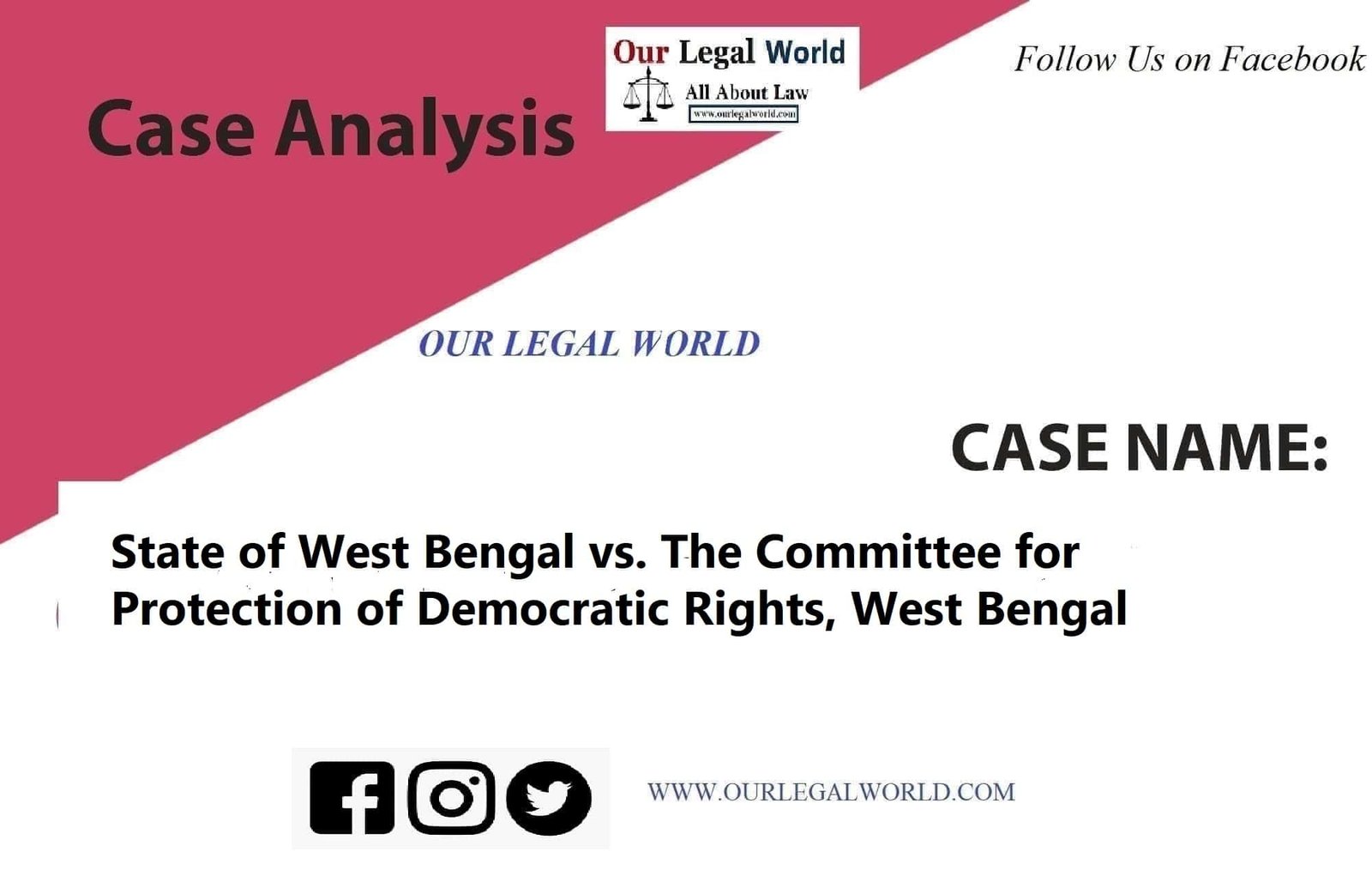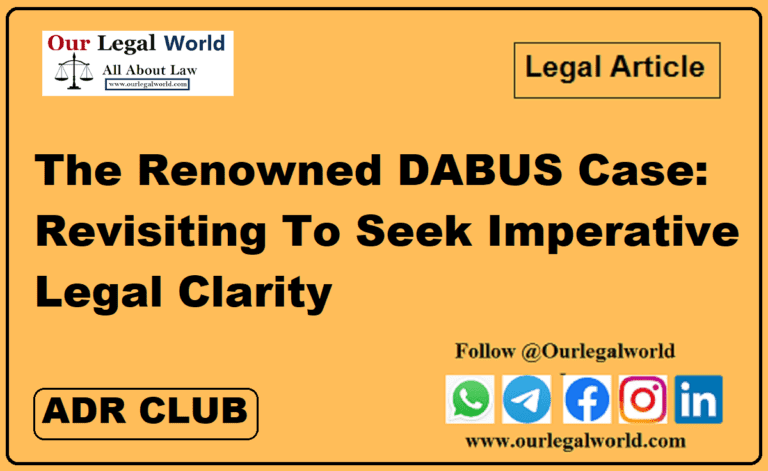State of West Bengal vs. The Committee for Protection of Democratic Rights, West Bengal: Case Analysis
Case name: State of West Bengal vs. Committee for Protection of Democratic Rights, West Bengal Citation: (2010) 3 SCC 571 Court name: The Supreme Court of India Date of Judgment: 17 February, 2010
Introduction:
The Supreme Court in the present case gave a wide interpretation to the power of judicial review conferred upon it by Article 32 and upon High Courts under Article 226 of the Constitution. The separation of power between the Parliament and the State Legislature was also discussed at length.
Facts:
- Attack by mob
The attack took place on 4 January 2001 whereby Abdul Rahaman Mondal and other members of the political party were attacked by a mob of 50 to 60 people near his residence. He managed to escape from the havoc and witnessed the incident from a distance. A written complaint was filed in the Garbeta Police Station on the same day.
- Filing of FIR
The first information report (FIR) was filed on 5 January 2001 for the following offences:
(i) Indian Penal Code – sections 148, 149, 448, 436, 364, 302, 201
(ii) The Arms Act, 1959 – sections 25 and 27
(iii) The Explosives Act, 1884 – section 9 (B)
- Investigation by CID
On 8 January 2001 the CID was directed to take over the investigation in the case by the Director General of Police, West Bengal.
- Petition under Article 226 of the Constitution
The Committee for Protection of Democratic Rights filed a writ petition under Article 226 of the Constitution in the Calcutta High Court. It was alleged that more than three months had passed when the incident happened but the State Police took no substantial step. It was pleaded that the investigation be handed over to the CBI as the State Police is under the influence of the party in power. The CBI was established under the Delhi Special Establishment Act, 194. The High Court passed the order in favor of the appellant and directed that the CBI should take over the investigation.
- Special Leave Petition
A special leave petition was filed by the State of West Bengal in the Supreme Court challenging the order passed by the Calcutta High Court. The case was put before the Constitution Bench as it involved a question of great importance.
Issue:
Whether the High Court, in exercise of its jurisdiction under Article 226 of the Constitution, can direct the CBI to investigate a cognizable offence, which is alleged to have taken place within the territorial jurisdiction of another State, without the consent of that State Government?
State of West Bengal:
- The learned senior counsel representing the State of West Bengal referred to
(i) Entry 80 List 1 of 7th Schedule,
(ii) Entry 2 List 2 of 7th Schedule,
(iii) Sections 5 and 6 of the Special Police Act,
argued that on the above provisions, that Parliament is strictly prohibited to enact any law that permits the police of one state to investigate an offence committed in another state, without the consent of that particular state.
- The state legislature has exclusive jurisdiction regarding the police under entry 2 list 2 of 7th schedule. This exclusive jurisdiction cannot be taken away by any act of Parliament.
- The three organs of the State i.e the legislature, the executive and the judiciary have been entrusted with certain functions by the Constitution. These organs should not interfere within the functioning of other organs and should not act beyond the scope of its functions.
- The main argument on behalf of the state of West Bengal was that the federal structure as well as the principle of the separation of powers forms a part of the basic structure of the Constitution. Hence, the Central Government and the Constitutional Courts cannot interfere with the exclusive jurisdiction conferred on the state legislature by list 2.
- The learned counsel notably mentioned that in the case of Supreme Court Bar Association vs. Union of India, it was held that Article 142 of the Constitution cannot be used by the Courts in contrary to the express provisions of law.
- Clause (2) of Article 226 of the Constitution limits the jurisdiction of the High Courts. It restricts the High Courts to issue directions to the authorities that fall outside the territories over which it has jurisdiction. In the present case, the CBI being an outsider in connection with the incident had no valid authority to conduct the investigation.
The Union of India:
- The learned counsel appearing for the Union of India strongly criticized the contention of the State of West Bengal that entry 80 List 1 of 7th schedule restricts the Parliament’s legislative power and section 6 of the Special Police Act, restricts the Central Government’s power also the Constitutional Courts are to be restricted from the same provisions is without foundation. Because the Supreme Court and the High Courts are under obligation to protect the citizens and ensure their fundamental rights under Articles 32 and 226 of the Constitution respectively.
- It was further argued that the contention of the appellants that the Courts by handing over the investigation to the CBI without the consent of the concerned State Government violate the federal structure of the Constitution, is misrepresented as it overlooks the basic fact that in a federal structure, it is the duty of the Courts to support the constitutional values and to enforce the limitations set out in the Constitution. For supporting this statement, emphasis was put on the decisions given by the Supreme Court in the following cases:
(i) The State of Rajasthan and Ors. vs. Union of India and Ors.
(ii) S.R. Bommai and Ors. vs. Union of India and Ors.
(iii) Kuldip Nayar and Ors. vs. Union of India and Ors.
- The learned counsel stated that the power of judicial review conferred on the Supreme Court and the High Courts is a part of basic structure. Therefore, no limitation can be imposed on such power. The courts are discharging their duties under Articles 32 or 226 as the case may be. Hence, it is wrong to say that it is overriding the doctrine of separation of power.
Also Read: Indian Council for Enviro-Legal Action v. Union of India: Polluter Pays
Judgment:
- The Supreme Court held that the power of judicial review is an essential feature of the basic structure of the Constitution. The jurisdiction conferred on the High Courts under Article 226 and on the Supreme Court under Article 32 of the Constitution ensures the citizens of their fundamental rights. The Parliament cannot put restrictions on such power of the constitutional courts.
- In a federal structure, there is a distribution of power between the Parliament and the State Legislature. Such distribution imposes limitations on legislative power. To ascertain whether such limitation is just or unjust, requires an authority other than the Parliament. The Constitutional Courts play such a role through the power of judicial review.
- If the federal structure is or likely to be violated by any legislative action, the Constitution takes care to protect the federal structure by ensuring that Courts act as guardians and interpreters of the Constitution and provide effective remedy under Articles 32 and 226. Under such circumstances, any direction, order or writ issued by the Supreme Court or the High Courts cannot be said as violating the federal structure.
- Any restrictions on the Parliament do not amount to restriction on the power of judiciary under Articles 32 and 226 of the Constitution.
- If according to the provisions of entry 2 list 2 of 7th schedule, entry 2A and entry 80 of list 1, the consent of the State Government is necessary before conducting an investigation by CBI or any other agency, there is no reason as to why the courts should be prevented from enforcing the same power which the Union Government can exercise regarding the provisions of the statute. In the opinion of the Court, exercise of such power by the Constitutional Courts would not violate the doctrine of the separation of powers.
- When the Special Police Act itself provides that the CBI can take up investigation of the case which is outside its jurisdiction only on the consent of the concerned State, the court can also exercise its constitutional power of judicial review and direct the CBI to take up the investigation within the jurisdiction of the State. Section 6 of the Special Police Act cannot take away the constitutional power of the High Court under Article 226.
- Finally, the court concluded that the High Court in exercise of its jurisdiction under Article 226 of the Constitution, can direct the CBI to investigate into the matter of cognizable offence outside the territory of the State without the consent of the State Government. Such order of the High Court does not violate the doctrine of separation of power and is completely valid.
Conclusion:
This case serves as a landmark judgment in constitutional law. The court elaborated the concepts of judicial review and separation of power between the Union and the State.
References:
- https://indiankanoon.org › doc
State Of West Bengal & Ors vs Committee for Protection of Democratic Rights
- https://lawbriefs.in ›
State of West Bengal & others v/s. Committee for Protection of Democratic Rights







